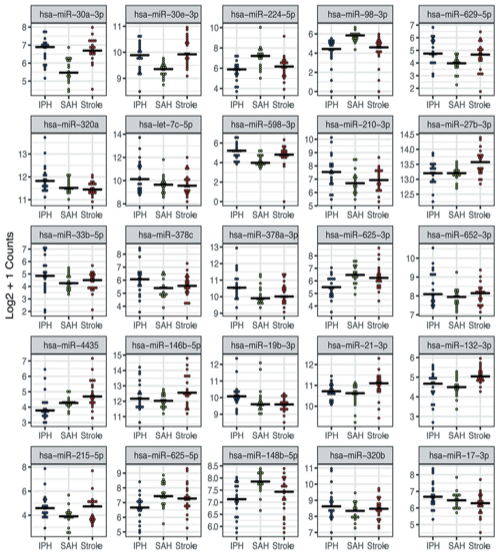Abstract
Rapid identification of patients suffering from cerebral ischaemia, while excluding intracerebral haemorrhage, can assist with patient triage and expand patient access to chemical and mechanical revascularization. We sought to identify blood-based, extracellular microRNAs 15 (ex-miRNAs) derived from extracellular vesicles associated with major stroke subtypes using clinical samples from subjects with spontaneous intraparenchymal haemorrhage (IPH), aneurysmal subarachnoid haemorrhage (SAH) and ischaemic stroke due to cerebral vessel occlusion. We collected blood from patients presenting with IPH (n = 19), SAH (n = 17) and ischaemic stroke (n = 21). We isolated extracellular vesicles from plasma, extracted RNA cargo, 20 sequenced the small RNAs and performed bioinformatic analyses to identify ex-miRNA biomarkers predictive of the stroke subtypes. Sixty-seven miRNAs were significantly variant across the stroke subtypes. A subset of exmiRNAs differed between haemorrhagic and ischaemic strokes, and LASSO analysis could distinguish SAH from the other subtypes with an accuracy of 0.972 ± 0.002. Further analyses predicted 25 miRNA classifiers that stratify IPH from ischaemic stroke with an accuracy of 0.811 ± 0.004 and distinguish haemorrhagic from ischaemic stroke with an accuracy of 0.813 ± 0.003. Blood-based, ex-miRNAs have predictive value, and could be capable of distinguishing between major stroke subtypes with refinement and validation. Such a biomarker could one day aid in the triage of patients to expand the pool eligible for effective treatment.
